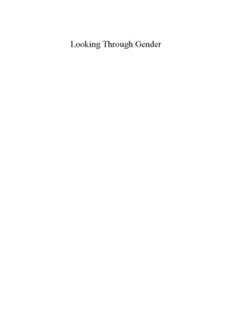
Looking through gender: post-1980 British and Irish drama PDF
Preview Looking through gender: post-1980 British and Irish drama
Looking Through Gender Looking Through Gender: Post-1980 British and Irish Drama By Samuele Grassi Looking Through Gender: Post-1980 British and Irish Drama, by Samuele Grassi This book first published 2011 Cambridge Scholars Publishing 12 Back Chapman Street, Newcastle upon Tyne, NE6 2XX, UK British Library Cataloguing in Publication Data A catalogue record for this book is available from the British Library Copyright © 2011 by Samuele Grassi All rights for this book reserved. No part of this book may be reproduced, stored in a retrieval system, or transmitted, in any form or by any means, electronic, mechanical, photocopying, recording or otherwise, without the prior permission of the copyright owner. ISBN (10): 1-4438-2873-4, ISBN (13): 978-1-4438-2873-4 Ai miei genitori CONTENTS Acknowledgments......................................................................................ix PART I:ON DRAMATURGY Chapter One.................................................................................................3 Gender on the British and Irish Stages (1980-Today): An Overview Introduction: performing bodies, performing genders The theatre and the “literary Canon”: an analysis of Britain and Ireland Structural and political notes Chapter Two..............................................................................................19 Women’s Bodies in the Plays of Caryl Churchill and Timberlake Wertenbaker “She’s not one of us”: plays for Margaret Thatcher Fairies, Folklore, and the “becoming-woman” Migrant and scary bodies in late capitalist Europe Chapter Three............................................................................................37 Contemporary Irish Women Playwrights Between realism and experimentation: Northern Irish women playwrights “Decentring” the Celtic Tiger: Women playwrights and the Republic PART II:PERFORMING GENDERS Chapter Four..............................................................................................57 Queering Masculinities Socialism for the future: on Mark Ravenhill Queer Irish plays Wilde Stories: Britain and Ireland viii(cid:3) Table of Contents Chapter Five..............................................................................................81 Queering Femininities In the archives of black lesbian feeling: Jackie Kay’s Chiaroscuro and Mojisola Adebayo’s Moj of the Antarctic Lesbian futures and butch aesthetics: on Nina Rapi Queenie on stage: the theatre of Valerie Mason-John Chapter Six..............................................................................................103 Two Companies Charabanc Theatre Company Glasshouse Productions PART III:CASE STUDIES Chapter Seven..........................................................................................121 Neil Bartlett Chapter Eight...........................................................................................137 Claire Dowie Chapter Nine............................................................................................147 Kevin Elyot Chapter Ten.............................................................................................163 Sarah Kane Chapter Eleven........................................................................................177 Frank McGuinness Afterword................................................................................................187 References...............................................................................................191 Index........................................................................................................209 ACKNOWLEDGEMENTS This volume would not have been possible without the help and support of several people. First, I want to thank Liana Borghi and Fiorenzo Fantaccini at the University of Firenze, and Richard Cave (Royal Holloway University of London) for their invaluable insight into my thinking on queer and Ireland, and for their generous advice; I owe much to them. Ornella De Zordo (University of Firenze) gave her support over the research phase. My sincere thanks also to Paulene Healey for proofreading the English with a keen eye. John Gilbert, Ilse Girona, and Christine Richardson who checked the English of this work in its early stages. I am particularly grateful to Annabel Arden and Stephen Jeffreys for putting me in touch with playwrights and structures in London, and for letting me enjoy the Out of Joint rehearsal in an unforgettable evening in November 2008. Lynette Goddard (Royal Holloway), Gabriele Griffin (University of York), David Halperin (University of Michigan), Jamie Heckert (University of Edinburgh), Deirdre Osborne (Goldsmiths College, London), Marco Pustianaz (University of Piemonte Orientale), Dan Rebellato (Royal Holloway), and Brenda Winter (Queen’s University, Belfast) have been extremely helpful either through e-mail contact or in discussion over my research period in London in the winter of 2008-9. Anne Mulhall (UCD, Dublin), Gavin Brown (University of Leicester), and Stephen Knight (Cardiff University) sent me their essays for critical use at different stages of my writing. I am also grateful for the expertise of Giovanna Mochi (University of Siena) and Valerio Viviani (University of Tuscia, Viterbo), whose understanding aided me considerably in this work. The greatest contribution to my work and my greatest debt is to the playwrights and performers I have interviewed who have answered my questions and provided material: Neil Bartlett, Loughlin Deegan, Emma Donoghue, Claire Dowie, Kevin Elyot, Trudy Hayes, Frank McGuinness, Valerie Mason-John, Philip Osment, and Nina Rapi. I hope my writing shows even in a small part my gratitude for their sincere commitment and interest. For discussing the playwrights and their work and helping me with scripts and other unpublished sources, my special thanks go to: Rick Bébout, Paola Cavallin, Martin Humphreis (Cinema Museum, London), x(cid:3) Acknowledgements Mel Kenyon and her staff at Casarotto Ramsay (London); Mary Nicotra; Julie Parker at the Drill Hall (London); Caroline Williams and the staff at Irish Theatre Institute (Dublin); the staff at Dublin Theatre Festival Office (Dublin); Colin Watkeys. I am also grateful to Rhona Trench (School of Business and Humanities, IT Sligo) and to the organising committee at IASIL 2008 Conference (Oporto, Portugal) for giving me an opportunity to present my work. The research phase was enriched by the kind collaboration of institutions and their staff. I am indebted to Kathleen E. Bethel (Northwestern University Library); Eliza Bent (American Theatre magazine, New York); Kathleen Dickson and the staff at BFI (London); Silvia Gallotti and the staff at Hall-Carpenter Archives, LSE (London); Paul Keith (Gerber/Hart Library, Chicago); Mairéad Lynch (Abbey Theatre, Dublin); Euan McArthur (University of Dundee, Scotland); Margherita Orlando (National Theatre, London); Sarah Steenson and Patricia Walker at Ulster and Irish Studies, Linen Hall Library (Belfast); the staff at V&A Theatre Collections Archives, Blythe House and Tate Enterprises Ltd (London). My thanks also to Arianna Antonielli (University of Firenze) for her suggestions on editing the thesis, and for compiling the Index; to Mike Markiewicz at ArenaPal (London) for the cover photograph, and to Alessandro Senatori/Musigraphia for producing the book design. I am indebted to Carol Koulikourdi and Amanda Millar at CSP for believing in this project and for bringing it into publication. My warmest thank-you goes to my family, to my friends, and to Gabriele all of whom have helped make this possible. Note A longer version of the section on Glasshouse Productions (Chapter 6) has been published in Deviant Acts: Essays on queer performance, ed. David Cregan (Dublin: Carysfort Press, 2009) 151-69.
